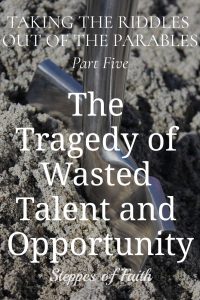by Gina, Steppes of Faith

“Well done, good and faithful servant…enter into the joy of your lord.” Matthew 25:21
My husband can make an apple pie that would (in my humble opinion) put any fancy pastry chef to shame. I don’t know what he does, but his pies always turn out perfectly flaky, perfectly browned, perfectly sweet, perfectly spiced…. It’s a pure slice of heaven every time he makes it. Apparently, God blessed him with some kind of special pie talent. And, thank goodness because I can barely bake cookies!
Having a talent or a knack for something is a gift from the Lord; but, while having a talent can be fun and unique, it can also carry responsibility. And sometimes a talent isn’t what you think.
In the last part of this series from the book of Matthew, “Taking the Riddles Out of the Parables,” let’s take a closer look at the one that completely baffled me for years- Jesus’ parable of the talents in Matthew 25:14.
What is a Talent?
Many people have heard the parable of the talents. I think most of us understand the gist of it, but there seem to be some errors in what we think it means. Some people think it’s about money and investing. Others think it’s about our actual physical abilities. And some think it’s about obedience. Beyond all that, why is the master of the servants so cranky?
Let’s break it down.
Here we find another parable where Jesus is trying to describe the kingdom of heaven and what God wants us to do. The master in the story represents God and the servants represent us. If you need a quick refresher, you can click right here to read the parable again. It’s okay, go ahead. I’ll be here when you get back.
Ok, ready?
So, here in this parable, the master is going out of town and he has given talents to three of his servants to multiply. One servant gets one talent, another gets two, and the third gets five. Each servant got what he got because of his ability to do something with it. So, we can pretty much assume the guy who got five talents had more ability than the guy who only got one.
What exactly is a talent, you ask?
A talent is commonly a special skill, but it this case it was a form of money. Actually, it was a measurement of money, not actual money. That means a talent of gold was worth more than a talent of silver even though they both weighed the same. Since gold was so valuable at the time, silver was the common form of currency. So, just for context, now we know that the servants were each given a weighted measurement of silver and it was up to each servant to do something with it.
The Master Returns
This is where some people think Jesus is talking about money and generosity. In verse 16, the servants set out to multiply their talents. Both the five-talent and the two-talent servants double their money by trading with others. But, the guy with one talent did nothing. He hid his in the ground. Odd but true.
When the master returned from his trip, he met with all the servants to find out how they did. Naturally, he was pleased with the five-talent and two-talent servants, enough that he gave them both a promotion of sorts. In verse 21 the master tells them, “Well done, good and faithful servant; you were faithful over a few things. I will make you a ruler over many things. Enter into the joy of your lord.”
Then the one-talent servant stepped forward, and this is where I got confused. I was so puzzled I asked two different pastors about it and neither could give me a clear answer. So, me being stubborn, I just had to research it, and this is what I found out.
Manners Count
The servant, knowing he didn’t do anything with his talent, bravely admits to the master,
“Lord, I knew you to be a hard man, reaping where you have not sown, and gathering where you have not scattered seed. And I was afraid, and I went and hid your talent in the ground. Look, there you have what is yours.”
So, I’m thinking…okay, the servant completely admitted what he did. He didn’t lie to him. Plus, he didn’t go out and buy shoes or go to the movies with his buddies with the money. He saved it, and then he gave it all back. Why is the master so upset? Here’s why.
First of all, the servant was speaking to the master very disrespectfully. As Christians, we should continually strive to be respectful of others no matter who they are, especially the Lord. Manners always matter.
Secondly, the servant accuses the master of being cruel. This is also disrespectful, but when we remember that the master represents God in this parable we can quickly see how wrong the servant is.
God is never cruel. If there’s one thing God isn’t, it’s that. We serve a kind and benevolent God who deserves to get angry when His children disobey Him just like any father would. He feels disappointment, but He’s not cruel.

The Sin of Laziness
The part that confused me the most was right here. The master says, “You knew that I reap where I have not sown and gather where I have not scattered seed.” I always took that as the master pretty much calling the servant an idiot after already calling him wicked and lazy. If he’s going to be condescending, why would the servant want to obey the master’s orders?
Further, if the master is sowing and gathering where he shouldn’t, isn’t that stealing? Wasn’t it really the master who is being wicked and lazy? Why should he feel entitled to have his stolen money multiplied?
To top it off, the master turns and uses the servant’s accusations against him! What the? I was really confused.
Here’s what’s going on. Stay with me.
The master accuses the servant, not to justify his own actions, but to condemn the servant’s laziness. The master never admits to any wrongdoing, but that is irrelevant. The focus is more on the servant’s disobedience, which is why the master accuses the servant with the servant’s own words. Jesus’ point is the servant does not represent a true believer of God since he obviously had no real knowledge or understanding of the master.
Here’s another point: if the servant really and truly believed that the master was so cruel, the servant should have been more inspired to obey. When we remember that the master illustrates God and the servant is us, we can say this another way. If God is so cruel and mean as so many people accuse Him to be, do we have any excuses for being lazy knowing how much power He has?
God is God and He can do as He pleases. The servant’s original accusation against the master ̶ whether true or not ̶ does not justify the servant’s laziness. Whatever we might think about God, there is nothing that justifies our laziness either.
Consequences
Since this parable illustrates the kingdom of heaven, naturally there must be a consequence for sin, which is always death. Jesus addresses this in verse 29,
“For to everyone who has, more will be given, and he will have abundance; but from him who does not have, even what he has will be taken away. And cast the unprofitable servant into the outer darkness. There will be weeping and gnashing of teeth.”
If we prove ourselves faithful to God, He will richly bless us and continue to do so the more we share Christ’s love and the message of the cross.
But, for those who disobey or refuse to acknowledge Him ̶ if they hide their talent in the ground ̶ they will pay the price of being eternally cast into the outer darkness. Jesus is again talking about Hell where you can be sure there will indeed be a lot of wailing and crying and utter torment.
Talent is Responsibility
In this parable, having a talent means having a responsibility. It’s the responsibility of taking hold of opportunities to bear fruit for God when He hands them to us. If we are truly faithful, we will obey God’s command to share our treasure (our unique skill) and love others at every possible chance whether gives us five opportunities (talents) or just one.
Grabbing opportunities takes some initiative on our part. It takes a little work. It takes getting up off the couch or stepping away from our favorite electronic devices to make a difference in this fallen world. The servant did not do this. He buried his opportunity. And like many people, he would rather disobey God and take his chances on God’s reaction. Jesus warns us there is a consequence for that decision.

The Bottom Line
If you or anyone you know is a non-believer, this is the lesson Jesus doesn’t want you to miss. You cannot disobey and mock God and be disrespectful to Him and still expect to escape Hell. Only through surrender and complete obedience to Jesus Christ can we truly experience God’s grace and find a way to heaven.
If you are a follower of Christ, I encourage you to obey the Lord no matter what He’s asking you to do. Grab hold of the opportunities He gives you to share the Good News. Use and share your God-given talent and skills with all the people you encounter every day, and God will bless you for it.
Then after a while…when the time is right…after you have multiplied your blessings…you can look forward to hearing the sweetest words we could ever hope to hear God say to us….
“Well done, good and faithful servant. Enter into the joy of your Lord.”
Your Turn
This is a long parable! Did it ever confuse you too? Maybe you had a different understanding of it. Come share your ideas and thoughts, won’t you? Let’s take all the riddles out of this parable so we can help each other better understand Jesus’ message of heaven.
Further Reading
Jesus told over 40 parables in various places throughout the Gospels, all of them relating one way or another to our salvation and the kingdom of heaven. Do you have a favorite? Here’s a list of all 40 of them if you’re curious, courtesy of Access Jesus.
And, if you missed last week’s article about guarding your treasure of salvation (a.k.a. talents), you can find the full post right here. I pray it encourages you to value your faith in a more meaningful way so you can go deeper with God. 


Hi Claudette! So glad I could help you. Keep praying and remember His promises to lead you every step of the way. He is the lamp shining on your feet and He won’t let you down. I’m sure you have many talents and skills that would benefit others for God’s glory. Don’t give up! He blesses those who endure. You can do it! Thanks for reading. I’ll look for you on Tailwind too. God bless!
Hi Gina!
Being a fairly new Christian, I too struggled with this particular parable. I’d never thought about it this way and am so grateful for your insightful and concise explanation. I’ve also struggled with using my talents. I’ve been afraid of being prosperous and falling into the trap of goal-getting as a result of my own pride. I’ve been mediatating on Psalm 37:5 “commit everything you do to the Lord. Trust Him, and he will help you.” It’s helped but having this understanding ties all the pieces together. Thank you for your valuable and helpful post.
I found you on Tailwind BTW:)